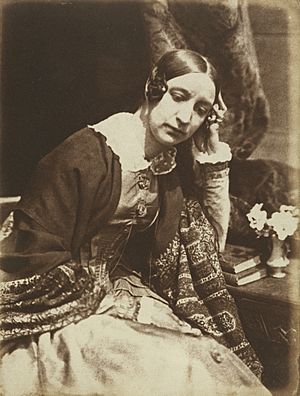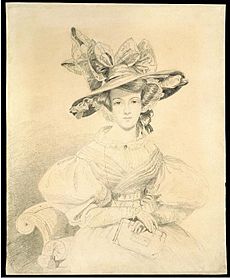Elizabeth Eastlake facts for kids
Quick facts for kids
Elizabeth Eastlake
|
|
|---|---|

Elizabeth Rigby, the future Lady Eastlake, photographed about 1847 by Hill & Adamson
|
|
| Born |
Elizabeth Rigby
17 November 1809 Norwich, England, United Kingdom
|
| Died | 1 October 1893 (aged 83) |
| Nationality | English |
| Known for | Art criticism |
| Spouse(s) | Sir Charles Lock Eastlake |
Elizabeth, Lady Eastlake (born Elizabeth Rigby; November 17, 1809 – October 2, 1893) was an important English writer and art expert. She wrote often for a famous magazine called the Quarterly Review. Elizabeth Eastlake was known for her many writings and for being a big part of the art scene in London.
Contents
Elizabeth Eastlake's Early Life and Travels
Elizabeth Eastlake was born in Norwich, England. She was one of many children of Edward and Anne Rigby. Her father was a doctor and a smart scholar. Both her parents included her in their social life, where she met many important people and thinkers.
From a young age, Elizabeth loved to draw. She kept studying art into her twenties. An artist named Edward Thomas Daniell taught her how to draw and etch. She was taught at home and learned French and Italian.
In 1827, Elizabeth became ill. She went to Germany and Switzerland to get better. She stayed there for two years. During this time, she started her writing career by translating an essay about English art. Later, in 1835, she went to Germany again. This trip led to an article she wrote about the famous writer Goethe.
After visiting her married sister in Russia and Estonia, Elizabeth wrote about her travels. Her published letters and a travel book called A Residence on the Shores of the Baltic (1841) were very popular. Because of this, the editor of the Quarterly Review, John Gibson Lockhart, asked her to write for his magazine.
Moving to Edinburgh and Meeting Charles Eastlake
In 1842, Elizabeth's mother, Anne Rigby, moved with her daughters to Edinburgh, Scotland. Elizabeth's writing career helped her meet many smart people there. These included Lord Jeffrey, the publisher John Murray, and the photographer David Octavius Hill. Hill took about 20 early photographs of her, with help from Robert Adamson. These photos were called calotypes.
In 1846, Elizabeth wrote in her diary that there were many good things about being an unmarried woman. However, three years later, when she was 40, she married Sir Charles Lock Eastlake. He was an artist, an art historian, and a critic. He was also the first Director of the National Gallery in London. In 1853, he became the first president of the Photographic Society.
Elizabeth joined her husband in his busy work and social life. They often hosted artists like Edwin Henry Landseer. They also met many other well-known people, from Lord Macaulay to Anna Jameson and Ada Lovelace. Elizabeth continued to travel around Europe in the 1850s and 1860s. She and her husband visited many countries to find new artworks for the National Gallery.
Elizabeth Eastlake's Art Writings

Elizabeth Eastlake wrote a lot about art. A book by Julie Sheldon lists all her writings. Here are some of her most important works:
Reviews of Famous Novels
In 1848, she wrote reviews of Vanity Fair and Jane Eyre for the Quarterly Review. She was very critical of Jane Eyre. She questioned if the book was moral, writing that its popularity showed "how deeply the love for illegitimate romance is implanted in our nature." She called it "a very remarkable book" but said it had "horrid taste."
Music and the Art of Dress
In 1852, she published a book called Music and the Art of Dress. This book included two essays she had written earlier for the Quarterly Review on these topics.
Thoughts on Modern Painting
In 1856, she wrote a long review of John Ruskin's ideas about art in the Quarterly Review. Ruskin was another famous art critic. Elizabeth disagreed with his main idea that painting was only valuable for showing thoughts. She believed that each art form, like painting, should do what only it can do. She thought that painting should show things, while poetry uses words to express thoughts.
Early Ideas on Photography
In 1857, she wrote an important article called Photography for the Quarterly Review. This was one of the first detailed writings about photography. Some people have said she didn't think photography was a fine art. She argued that photography copies details mechanically without judgment. However, she also said it was more exact than the human eye. She wrote that photography is the perfect tool for anything where art is a means, but not the main goal. This allows traditional art to be even more artistic.
Completing a Friend's Work
In 1864, Elizabeth finished the last two books of the Sacred and Legendary Art series. This series was started by her friend Anna Jameson, who had passed away.
Elizabeth also wrote about many other artists and topics. These included Madame de Stael, Anna Jameson, the Royal Female School of Art, Raphael, Michelangelo, Titian, Leonardo da Vinci, and Dürer. The last five became the subjects of her book Five Great Painters (1883).
She helped bring German art history ideas to England. She did this both by writing her own criticisms and by translating works by German art historians like G. F. Waagen and Franz Theodor Kugler. She sometimes worked with her husband, Charles Eastlake. After he died in 1865, she wrote a book about his life.
In 1895, her nephew, Charles Eastlake Smith, put together and published her letters and other writings.
Elizabeth Eastlake's Legacy
In the 1900s, Elizabeth Eastlake was mostly remembered for her article on Photography and her review of Jane Eyre. Her criticism of John Ruskin has been linked to her friendship with his wife, Effie Gray, who was separated from him.
However, historian Rosemary Mitchell believes that Elizabeth Eastlake's work as an art historian and writer was very important and original. Mitchell sees her as a smart and insightful critic. Marion Cleland Lochhead called Elizabeth Eastlake a "pioneer of feminine journalism," meaning she was one of the first important women journalists.
She is seen as one of the important women art historians in Britain during the 1800s, along with Anna Jameson and Emilia Dilke.
Works
- A Residence on the Shores of the Baltic (1841); London, 1844.
- Review of Jane Eyre by Eizabeth Rigby
- Music and The Art of Dress, two essays reprinted from the Quarterly Review (1852)
- Livonian Tales: The Disponent, The Wolves, The Jewess By the Author of Letters from the Baltic New York: Harper & Brothers. 1856. Fragile tan wrappers. No. 85 - Library of Select Novels
- Photography 1857
- 60 drawings by Elizabeth Rigby from the Tate Gallery
- The history of Our Lord as exemplified in works of art (1890)
- Baltische briefe...(Leipzig, F.A. Brockhaus, 1846)
- Journals and correspondence of Lady Eastlake (London, J. Murray, 1895)
See also
- Anna Brownell Jameson
- John Gibson
 | Isaac Myers |
 | D. Hamilton Jackson |
 | A. Philip Randolph |

